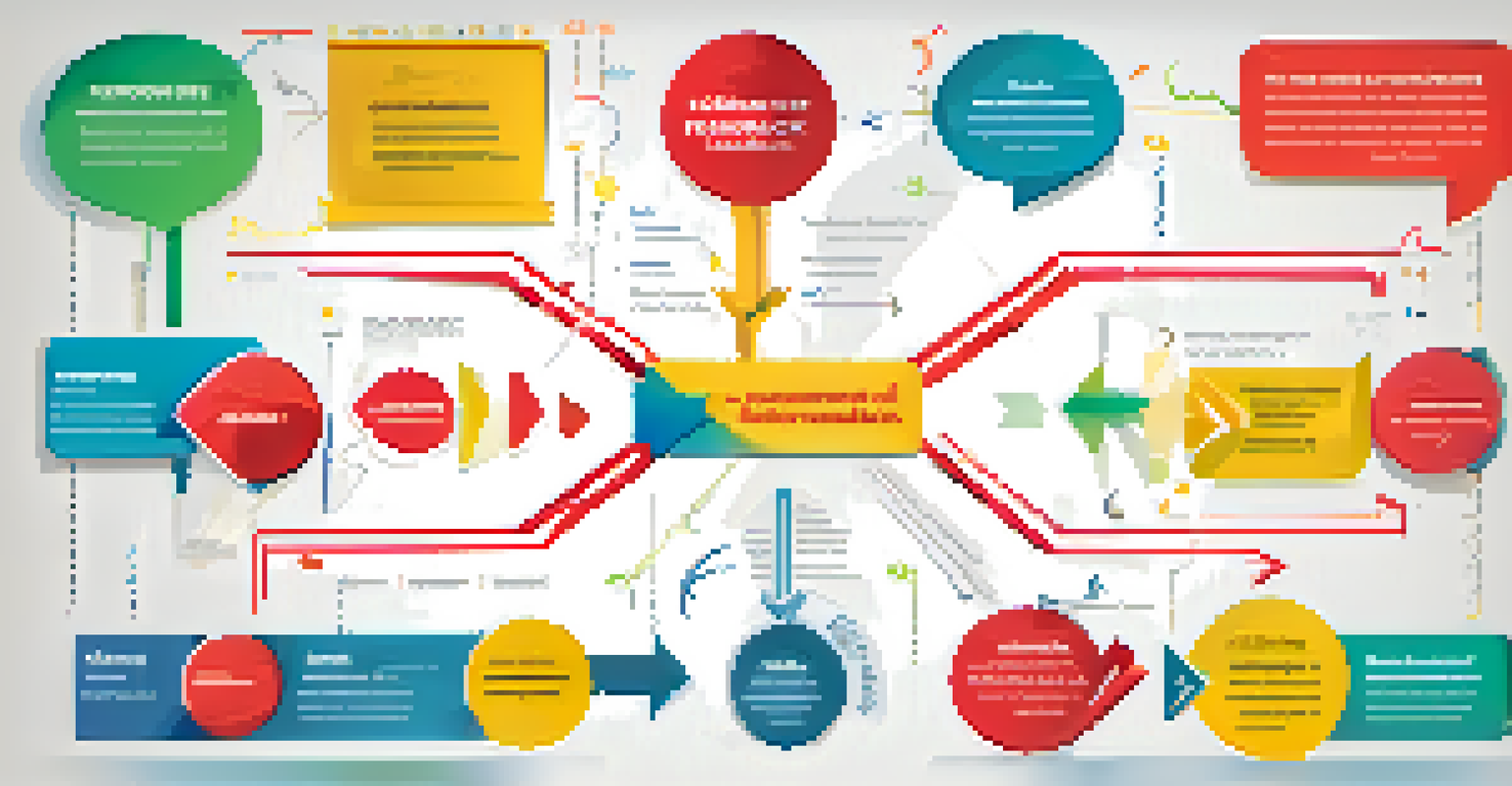The Importance of Customer Feedback in CRM Strategies

Understanding Customer Feedback in CRM
Customer feedback is essential for any effective Customer Relationship Management (CRM) strategy. It provides insights into customer preferences, expectations, and pain points. By listening to customers, businesses can tailor their services and products to meet those needs more effectively. This not only enhances customer satisfaction but also builds loyalty and trust, which are crucial for long-term success.
Your most unhappy customers are your greatest source of learning.
Moreover, customer feedback acts as a compass, guiding businesses toward areas requiring improvement. For instance, if multiple customers highlight a similar issue, it signals a need for immediate attention. This collective input helps businesses prioritize enhancements that resonate with their audience. Ultimately, a proactive approach to feedback can be a game-changer in the competitive landscape.
In addition to improving products, customer feedback also strengthens communication channels. When customers see that their opinions are valued, they are more likely to engage with the brand. This creates a feedback loop, where the more customers share, the better companies can serve them. In this way, customer feedback becomes the heart of an effective CRM strategy.
Types of Customer Feedback to Collect
Not all feedback is created equal, and understanding the types can enhance your CRM strategy. Qualitative feedback, like open-ended survey responses, provides deep insights into customer emotions and motivations. On the other hand, quantitative feedback, such as ratings and scores, offers measurable data that can be easily analyzed. Together, these insights can create a fuller picture of the customer experience.

Another important type of feedback is transactional feedback, collected after a specific interaction or purchase. This helps businesses understand the immediate impact of their services and identify areas for quick adjustments. For example, if a customer reports a long wait time during checkout, this feedback can prompt immediate operational changes to enhance efficiency.
Value of Customer Feedback
Customer feedback provides essential insights that help businesses improve products, enhance customer satisfaction, and build loyalty.
Finally, proactive feedback, such as suggestions or ideas for new features, can help businesses innovate. By encouraging customers to share their thoughts on potential improvements, companies can foster a culture of collaboration. This not only leads to better products but also strengthens the relationship between the brand and its customers.
Implementing Feedback Loops in CRM
Creating effective feedback loops is essential for integrating customer insights into CRM strategies. A feedback loop involves collecting customer input, analyzing it, and then acting on the findings. This cycle should be continuous, ensuring that improvements are made regularly based on real customer experiences. By doing so, businesses can demonstrate their commitment to customer satisfaction.
Feedback is the breakfast of champions.
To implement feedback loops, companies can utilize various tools and platforms. For instance, surveys, social media, and direct outreach can all be effective ways to gather customer opinions. Once feedback is collected, it's vital to analyze it to identify trends and patterns. This data can then inform strategic decisions, ensuring that actions are aligned with customer needs.
Moreover, communicating back to customers about the changes made based on their feedback is crucial. This not only reinforces the value of their input but also cultivates a sense of partnership. When customers see their suggestions lead to tangible improvements, it fosters a deeper connection with the brand.
Leveraging Feedback for Personalization
Customer feedback can be a powerful tool for personalization in CRM strategies. By understanding individual preferences and behaviors, businesses can tailor their communications and offerings. For example, if feedback indicates that a customer loves a particular product category, targeted promotions can be created to highlight new arrivals in that area. This personalized approach can lead to higher engagement and conversion rates.
Moreover, personalization extends beyond product recommendations; it also applies to customer service. Feedback can reveal how customers prefer to interact with a brand, whether through chat, email, or phone. By adapting to these preferences, businesses can enhance the overall customer experience and build stronger relationships.
Types of Feedback Matter
Collecting both qualitative and quantitative feedback allows businesses to create a comprehensive understanding of customer experiences.
In addition, personalized follow-ups after a purchase can further strengthen customer loyalty. For instance, sending a thank-you note or a request for feedback on the product shows customers that their opinions matter. This kind of attention can turn a one-time buyer into a lifelong advocate for the brand.
Analyzing Feedback for Strategic Insights
The analysis of customer feedback is a critical step in refining CRM strategies. Businesses need to look beyond surface-level comments and dive deep into the data to uncover actionable insights. Using tools like sentiment analysis can help identify overall customer sentiment and highlight specific areas of concern or praise. This analytical approach allows organizations to make informed strategic decisions.
Additionally, identifying trends over time is crucial for long-term planning. For instance, if feedback consistently points to a rise in demand for eco-friendly products, businesses can pivot their strategies to capitalize on this trend. By staying ahead of customer expectations, companies can position themselves as leaders in their industry.
Furthermore, sharing these insights across departments fosters a collaborative environment. When marketing, sales, and product development teams are aligned on customer feedback, they can work together to create cohesive strategies. This unified approach not only enhances the customer experience but also drives business growth.
The Role of Technology in Gathering Feedback
In today's digital age, technology plays a pivotal role in gathering and managing customer feedback. Tools like CRM software, survey platforms, and social media monitoring systems allow businesses to collect feedback efficiently. These technologies streamline the process, enabling companies to respond to customer concerns in real-time. This speed can significantly improve customer satisfaction and loyalty.
Moreover, advanced analytics tools can help businesses make sense of large volumes of feedback. By employing artificial intelligence and machine learning, companies can identify trends and patterns that might not be immediately apparent. This level of analysis can provide deeper insights, allowing for more informed decision-making.
Acting on Feedback is Crucial
Implementing changes based on customer feedback not only fosters trust but also strengthens relationships and improves overall customer engagement.
Additionally, technology facilitates the creation of engaging feedback channels. For instance, interactive surveys or instant chat options can encourage more customers to share their thoughts. By making the feedback process enjoyable and easy, businesses can gather richer insights and strengthen their customer relationships.
Closing the Loop: Acting on Customer Feedback
The final step in the customer feedback process is taking action based on the insights gathered. It's not enough to simply collect feedback; businesses must demonstrate that they value customer input by implementing changes. For instance, if feedback indicates that customers want a more user-friendly website, prioritizing this improvement can significantly enhance the customer experience.
Moreover, sharing the outcomes of these actions with customers is crucial. When customers see that their feedback has led to real changes, it reinforces their connection to the brand. This level of transparency fosters trust and encourages ongoing engagement as customers feel their opinions truly matter.

Finally, regularly revisiting the feedback loop ensures that businesses remain agile and responsive to evolving customer needs. As markets and consumer preferences change, staying attuned to customer feedback will help companies adapt and thrive. By embedding feedback into the core of CRM strategies, businesses can create lasting relationships with their customers.